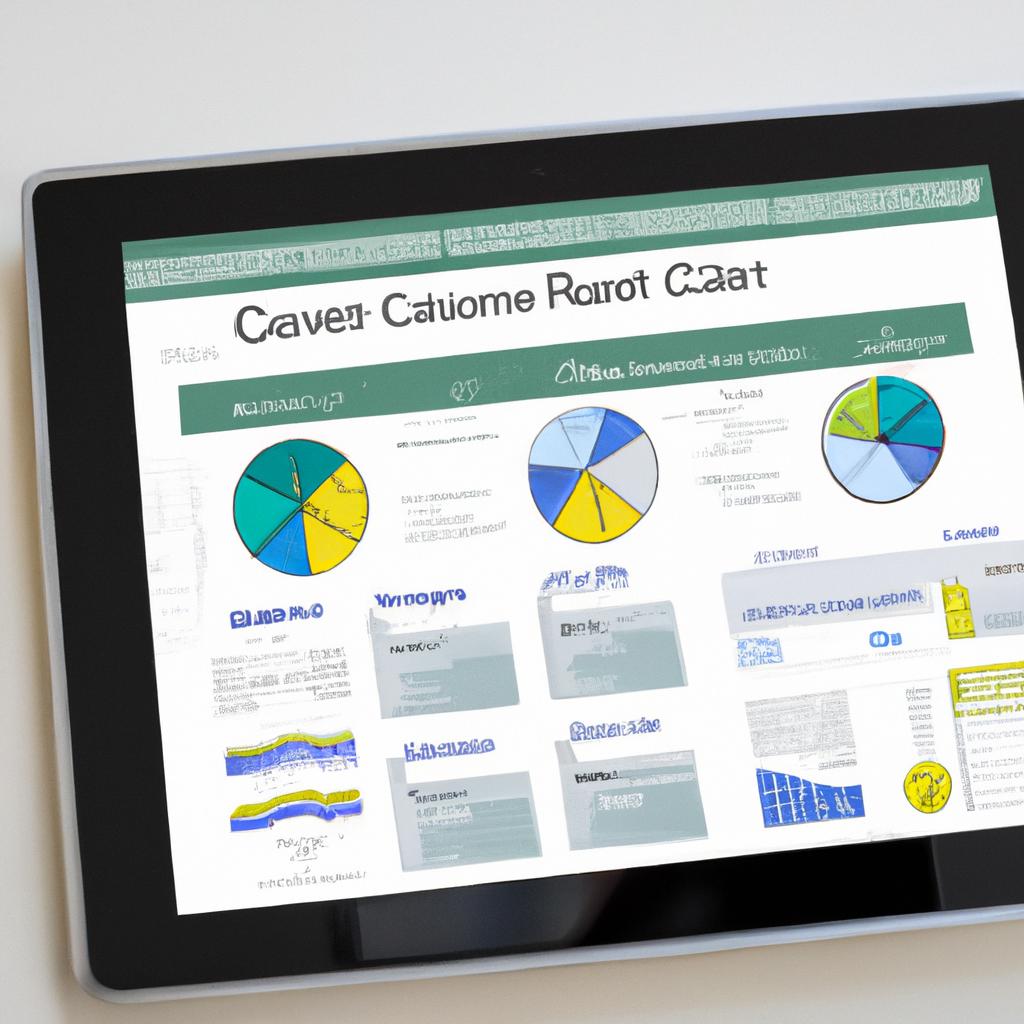The Importance of CRM Software for Financial Services Industry
As the financial services industry continues to evolve, companies are constantly searching for innovative ways to stay ahead of the competition and provide top-quality service to their clients. One such way is through the use of Customer Relationship Management (CRM) software.
What is CRM Software?

CRM software is a tool that enables companies to manage their interactions with customers and prospects. It provides a central database to store customer information, as well as tools to manage sales, marketing, and customer service activities.
Why is CRM Software Important for Financial Services Industry?

The financial services industry is highly competitive, and companies need to be able to differentiate themselves in order to succeed. CRM software can provide a significant competitive advantage by allowing companies to better understand their customers’ needs and preferences, and tailor their offerings accordingly.
Additionally, CRM software can help financial services companies streamline their workflow processes, leading to increased efficiency and profitability. It can also aid in compliance and regulatory adherence, which is of utmost importance in the heavily regulated financial services industry.
Brief Overview of the Article
This article will explore the benefits of CRM software for the financial services industry, including improved customer engagement, enhanced data management, streamlined workflow processes, increased sales and revenue, improved customer retention and loyalty, and better compliance and regulatory adherence. We will also discuss the key features of CRM software for financial services companies, as well as the factors to consider when choosing a CRM software provider. Finally, we will provide case studies of successful CRM software implementation in the financial services industry.
Benefits of CRM Software for Financial Services Industry
In the financial services industry, customer satisfaction is crucial for success. CRM software can provide numerous benefits to financial services companies, including:
Improved Customer Engagement
CRM software can provide a 360-degree view of the customer, allowing companies to better understand their needs and preferences. This enables companies to tailor their offerings and communications to better meet those needs, resulting in improved customer engagement and satisfaction.
Enhanced Data Management
CRM software provides a central database for customer information, making it easier for companies to store, manage, and access this information. This can lead to improved data quality, as well as better analysis and reporting capabilities.
Streamlined Workflow Processes
CRM software can help financial services companies streamline their workflow processes, leading to increased efficiency and productivity. This can help reduce costs and increase profitability, as well as free up time for employees to focus on higher-value tasks.
Increased Sales and Revenue
By providing insights into customer behavior and preferences, CRM software can help financial services companies identify new sales opportunities and improve their sales processes. This can lead to increased revenue and profitability.
Improved Customer Retention and Loyalty
CRM software can help financial services companies better understand their customers’ needs and preferences, enabling them to provide more personalized and relevant offerings. This can lead to increased customer retention and loyalty, as well as reduced churn.
Better Compliance and Regulatory Adherence
The financial services industry is heavily regulated, and non-compliance can result in significant fines and penalties. CRM software can help financial services companies manage compliance and regulatory requirements, ensuring that they are meeting all necessary standards and avoiding costly penalties.
Key Features of CRM Software for Financial Services Industry
When it comes to choosing a CRM software provider for your financial services company, it’s important to consider the key features that will best suit your needs. Here are some of the most important features to look for:
Contact and Account Management
This feature allows you to keep track of all your customer interactions in one place, including contact information, account details, and communication history. This makes it easier to provide personalized service to your customers, as well as track their preferences and needs.
Lead and Opportunity Management
This feature allows you to track potential sales leads and opportunities, from initial contact to conversion. It provides a way to prioritize leads and allocate resources more efficiently, ultimately leading to increased sales and revenue.
Sales Forecasting and Pipeline Management
This feature allows you to forecast future sales based on current trends and historical data. It also helps you manage your sales pipeline, providing visibility into the status of each opportunity and allowing you to identify any potential roadblocks or bottlenecks.
Marketing Automation and Campaign Management
This feature allows you to create and manage marketing campaigns, from email marketing to social media advertising. It provides tools to automate repetitive tasks, freeing up your time and resources for more high-level activities.
Analytics and Reporting
This feature provides insights into your customers and business performance, allowing you to make data-driven decisions. It provides real-time reporting and analysis of key metrics, such as sales, customer satisfaction, and marketing effectiveness.
Integration with Other Financial Software Systems
This feature allows you to integrate your CRM software with other financial software systems, such as accounting or investment management software. This provides a seamless experience for your customers and employees, and ensures that all your data is accurate and up-to-date.
Factors to Consider When Choosing CRM Software for Financial Services Industry
When choosing a CRM software provider for your financial services company, there are several factors to consider. Here are some of the most important:
Customization and Flexibility
Every financial services company is unique, with its own set of needs and requirements. It is essential to choose a CRM software provider that offers a high degree of customization and flexibility, allowing you to tailor the software to your specific needs. This can include custom fields, workflows, and integrations.
Security and Compliance
Due to the sensitive nature of financial data, security and compliance are of utmost importance when choosing a CRM software provider. Look for a provider that offers robust security measures, such as data encryption and regular security audits. Additionally, ensure that the provider is compliant with relevant regulations, such as GDPR and HIPAA.
Ease of Use and Implementation
CRM software should make your life easier, not more difficult. Choose a provider that offers a user-friendly interface and intuitive navigation, allowing you to quickly and easily access the information you need. Additionally, look for a provider that offers easy implementation and onboarding, minimizing disruption to your business operations.
Integration with Other Financial Software Systems
Your financial services company likely uses a variety of software systems, such as accounting software and portfolio management tools. Ensure that the CRM software provider you choose offers seamless integration with these systems, allowing for smooth data transfer and streamlined workflows.
Scalability and Pricing
Finally, consider the scalability and pricing of the CRM software provider. Your financial services company is likely to grow and evolve over time, so it is important to choose a provider that can scale with your business. Additionally, ensure that the pricing structure is transparent and predictable, with no hidden fees or surprises.
Case Studies: Successful Implementation of CRM Software in the Financial Services Industry
In this section, we will review several case studies of financial services companies that have successfully implemented CRM software and reaped the benefits.
ABC Bank
ABC Bank, a large regional bank, had been struggling with customer retention and engagement. They decided to implement a CRM software solution to better understand their customers’ needs and preferences, and improve their marketing efforts.
After implementing the CRM software, ABC Bank saw a significant increase in customer engagement and retention. They were able to segment their customer base and tailor their marketing efforts accordingly, resulting in a higher response rate and increased sales.
XYZ Insurance Company
XYZ Insurance Company, a mid-sized insurance provider, had been experiencing difficulties with their claims processing and workflow processes. They decided to implement a CRM software solution to streamline their processes and improve their customer service.
After implementing the CRM software, XYZ Insurance Company saw a significant increase in efficiency and profitability. Claims were processed more quickly and accurately, leading to increased customer satisfaction and retention.
PQR Investment Firm
PQR Investment Firm, a boutique investment firm, had been struggling with compliance and regulatory adherence. They decided to implement a CRM software solution to better manage their data and ensure compliance.
After implementing the CRM software, PQR Investment Firm saw a significant improvement in compliance and regulatory adherence. They were able to better manage their data and ensure that all necessary regulations were being met. This led to increased trust among their clients and a stronger reputation in the industry.
These case studies demonstrate that CRM software can be highly effective in improving customer engagement and retention, streamlining workflow processes, and ensuring compliance and regulatory adherence in the financial services industry.
Conclusion
In conclusion, CRM software is an invaluable tool for financial services companies looking to gain a competitive edge and provide top-quality service to their clients. With its ability to improve customer engagement, enhance data management, streamline workflow processes, increase sales and revenue, improve customer retention and loyalty, and aid in compliance and regulatory adherence, it’s no wonder that more and more financial services companies are adopting CRM software.
When choosing a CRM software provider, it’s important to consider factors such as customization and flexibility, security and compliance, ease of use and implementation, integration with other financial software systems, scalability and pricing. By doing so, companies can ensure that they choose the provider that best fits their needs.
Finally, the case studies provided in this article illustrate the success that can be achieved through the implementation of CRM software in the financial services industry. By following their lead, financial services companies can improve their bottom line while providing better service to their clients.

Comments are closed.